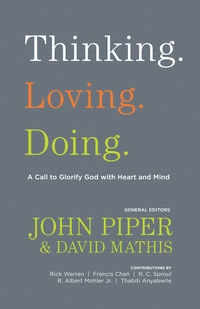I just finished reading Thinking. Loving. Doing. by John Piper, David Mathis, Rick Warren, Francis Chan, and others. WOW! This book is a followup to Piper’s Think that our entire faculty and staff at North Cobb Christian School read this past summer. I will eventually put my review of that book up here, but it will take multiple posts as there is so much to digest. Thinking.Loving.Doing was a great balance of knowledge and application. The premise of the book is that Christians are called to think, to love, and to do…all for the glory of God. This book is a collection of essays by a variety of authors and speakers that I love to hear from. Their points are based directly on Scripture and their purpose is God’s glory.
Below I have pasted some things that I highlighted while reading and hope they will be a blessing to you…
- One reality that helps us check our frequent blind spots and misjudgments is a Christian community.
- Because we are not God, because we are finite, not infinite, we cannot not everything at a glace, and therefore our knowledge is limited to one perspective or another.
- The Christian life is more than mere intellect.
- We are summoned to think and love and do, all to the glory of God in Christ, and not diminish any of the three.
- The writers of this book encourage us to pursue holistic Christianity. They want us to be thinkers-very engaged and serious thinkers-and more. To be feelers, with great passion for Jesus and his gospel, and more. Our Savior perfectly embodies all three and demonstrates that thinking, feeling, and doing indeed are not at odds but mutually strengthening and reinforcing.
- Don’t believe everything you think.
- Guard your mind from garbage.
- Psalm 101:3 “I will not set before my eyes anything that is worthless.”
- Never let up on learning.
- Proverbs 20:5 “Counsel in the heart of a man is like deep water; but a man of understanding will draw it out.”
- Proverbs 17:17 “Iron sharpens iron”
- Proverbs 18:15 “The mind of a smart person is eager to get knowledge [that’s a mark of intelligence!], and the wise person listens to learn more.”
- The Five Levels of Learning
- Knowledge
- Perspective (Wisdom)
- Conviction
- Character
- Skill
- Once we begin to develop convictions, we start developing habits—and the sum total of our habits is what we can call “character”.
- Ecclesiastes 10:10 “If the ax is dull and its edge unsharpened, more strength is needed, but skill will bring success.”
- Creeds must be turned into deeds.
- Let God stretch your imagination.
- Psalm 119:15 “I will meditate on your precepts and fix my eyes on your ways.”
- British historian David Begginton described evangelicalism in terms of four distinctives: Biblicism (a confidence that the Bible is the Word of God), conversionism (a belief that persons must come to a saving knowledge of the Lord Jesus Christ), crucicentrism (a belief that the cross and the resurrection are the central acts whereby God saves sinners), and activism (evangelicals are people who hold crusades, build colleges and seminaries, go on mission trips, organize conferences, and create periodicals and publishing houses).
- The real knowledge crisis is not merely what people do not know; it is also what they will not know.
- Because of the intellectual devastation brought about by the fall, we are under obligation to think about thinking.
- The task of the scientist and the task of the philosopher—even the task of the theologian—is to pursue knowledge wherever it may be found and whatever the consequences of that search may be.
- The word universe is a hybrid term. It comes from the combination of two distinct words—the word unity and the word diversity.
- There may be no group of people more addicted to novelty than theologians.
- We will never find an explanation for being, for life, or for motion if we try to find it outside the being and the character of God.
- The fullest expression of Christian living is a combination of head, hearts, and hands. It involves receiving truth through the head, which ignites new affections in the heart and flows out in action through the hands.
- Thinking is not the same as reacting.
- Thinking is not sloganeering.
- Thinking is not stereotyping.
- Thinking is not same as feeling.
- We have become uncomfortable with argument.
- There is a readiness to blur the significant differences in the major goals of religion.
- There is a tendency to avoid the big questions in life.
- The culture emphasizes subjective privatism and sincerity.
- 1 Corinthians 8:1-3 “Now concerning food offered to idols: we know that “all of us possess knowledge.” This “knowledge” puffs up, but love builds up. If anyone imagines that he knows something, he does not yet know as he ought to know. But if anyone loves God, he is known by God.”
- How hard do you think about people? How hard do you think about loving your fellow Christians? And how hard do you think about the lost?
- As you are learning, are you still loving?
- Paul says even if he had all knowledge but didn’t love, he would amount to nothing. In other words, you can be brilliant and worthless.
- Humility is not self-degradation. Putting yourself down is all about self. Humility is about thinking of others—considering others more important than yourself.
- We hope that you will not be romantic about the benefits of ignorance.



